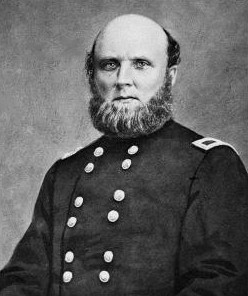Get Today in Masonic History into your Inbox. Sign up today for one of our email lists!
Need an article for your Trestleboard/Newsletter see our Use Policy
Egbert Benson Brown Passes Away

Today in Masonic History Egbert Benson Brown passes away in 1902.
Egbert Benson Brown was an American Civil War general.
Brown was born in Brownsville, New York on October 4th, 1816. In his youth he sailed on a whaler before settling in Toledo, Ohio in the early 1840's. In Toledo he became a respected grain dealer and built the first steam powered elevator in town. Eventually he became Mayor of Toledo before moving to St. Louis, Missouri in 1852. In St. Louis he engaged in the railroad industry.
In 1861, Brown was commissioned as a lieutenant colonel in the 7th Missouri Volunteer Regiment, a Union unit. In 1862 he resigned the position to be granted a commission as brigadier general of the Missouri State Militia, again a Union force. At the end of 1862 he was made brigadier general of the United States Volunteers. Brown's duties during the war consisted largely of suppressing Confederate Guerrillas and opposing raids coming from Arkansas and Indian Territory. In 1863 and 1864 he commanded the District of Central Missouri.
The high point of his career was when he twice faced noted Confederate General Joseph Shelby. In both battles, Brown was victorious, although in 1863 Brown was wounded in the arm and afterward loss the use of it.
Despite the fact Brown won most of his engagements, many critics felt he lacked vigor in the performance of his duties. This came to a head during Sterling Price's 1864 Raid. Price was a Confederate General who was having limited success with raids in Missouri and other parts of the Mississippi Theatre. At the Battle of Westport, where Price was ultimately defeated, Brown was relieved of command by Major General Alfred Pleasonton. Pleasonton promptly arrested Brown for failing to properly obey commands during the battle. Brown remained in military service until the end of the war.
After the war Brown returned to St. Louis where he was the United States pension agent until 1868. He then moved for some time to operate a farm in Illinois.
Brown passed away on February 11th, 1902 at his granddaughter's home in Missouri.
Brown was a member of Toledo Lodge No. 144 in Toledo, Ohio.
This article provided by Brother Eric C. Steele.

